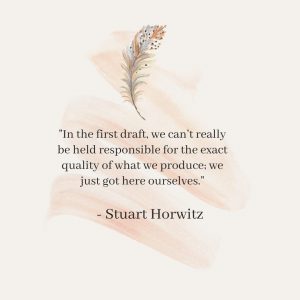We’ve left it open for you, so you don’t even need one of those little keys. Because writing is life, and keeping it real means forgoing the line between the personal and the professional.
Know What Draft You’re In
This post originally appeared on the San Francisco Writers Conference site.
 Instinctively, we know that every draft is different. In the first draft, we can’t really be held responsible for the exact quality of what we produce; we just got here, ourselves. We are just trying to cover the ground. In the second draft, we might be learning the ropes a bit more. We can say what the better stuff is that we are trying to bring up another level. By the third draft, we are ready to polish, decide, and hopefully finish something.
Instinctively, we know that every draft is different. In the first draft, we can’t really be held responsible for the exact quality of what we produce; we just got here, ourselves. We are just trying to cover the ground. In the second draft, we might be learning the ropes a bit more. We can say what the better stuff is that we are trying to bring up another level. By the third draft, we are ready to polish, decide, and hopefully finish something.
On that we can likely agree. We can also likely agree that writing is more complex than 1, 2, 3. In this paragraph, for example, there are—at this moment—sentences that were written in the first, second, and third drafts of this blog coexisting next to each other. The ones in third draft form I should likely leave alone. The ones in first draft form need the most attention. Revision is about knowing what you want to work on, in part by knowing what you don’t need to work on.
Let’s say that you are writing a memoir. Your beta readers demand a new through-line, one that will really explain why you are so fucked up. No more trying to save anyone, including yourself. And you agree—but everything else is so…done. What then?
Asking for a friend. That was me, obviously, planting new seeds in a forest where the entire canopy felt taken. How to grow these seedlings up first, and then transplant from cup to pot, and finally to the memoir text itself when they were well developed enough to take care of themselves? I started by writing out the new scenes in longhand in a journal. Nothing could escape from there unless it had explicit permission, in the form of passages being photocopied and cut up, to then be typed in their own word documents.
Know what draft you’re in. That’s the simple message. And be fair to the earlier drafts. I have two children, aged 15 and 22. Just because I can’t expect the same things from my 15 year-old — like driving, or always remembering to Venmo request me for the money I owe her — doesn’t mean her essence isn’t as wonderful. Or that she won’t get there. She will, through encouragement, and patience, and time.
You can’t rush a good idea. But you can know where present material falls in your overall process. If it is first draft material, you can try it out, get the feel, make a start, and find your stride. If it is second draft material, you can take some new opportunities, go where the work needs your attention, and go further, break through. And if it is third draft material, you can come from the strength of what has worked, culminate matters, and trust yourself enough to let it go.
Because now you have the wisdom to know the difference.

Leave a Reply